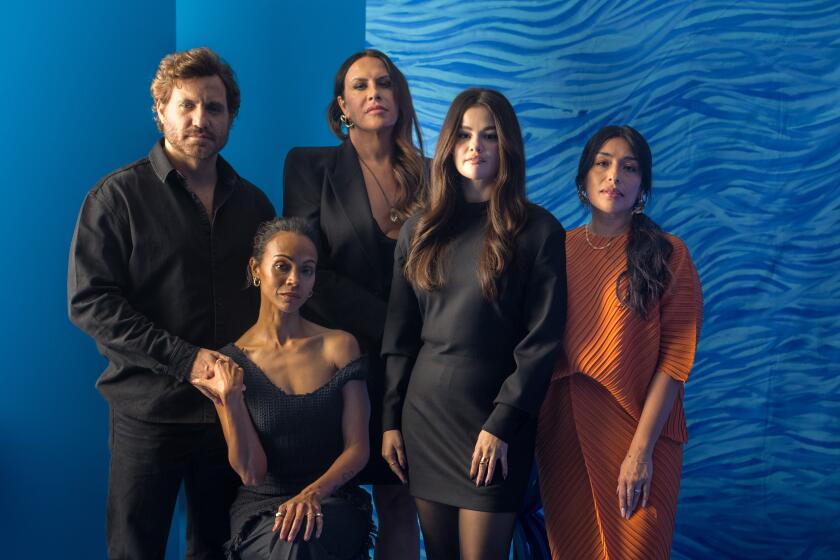Gold Standard: In the Oscar nominations, progress — and there was some — comes in fits and starts
Nominations for the 91st Oscars include record representation for LGBTQ stories, two nods for Mexican actresses and enough contradictory signals to confuse even the savviest awards season enthusiasts.
This year’s Oscar slate serves as a snapshot of a motion picture academy in transition. Three years into a diversity initiative aimed at doubling the number of women and minorities in its ranks by 2020, the academy has added nearly 2,400 members, including 2018’s record class of 928 invitees.That means roughly 30% of the current 7,902 voters weren’t around when “Spotlight” won best picture in 2016.
That massive overhaul — including more women (31%, up 6% since 2015), people of color (16%, double the number of three years ago) and international members (460 invited last year from 59 countries) — manifested itself Tuesday in a strong showing for world cinema, with five movies finding favor in races outside the foreign language category, including Alfonso Cuarón’s “Roma,” which, along with “The Favourite,” led all films with 10 nominations.
FULL COVERAGE: Oscar nominations 2019 »
Yet, as is always the case with progress, forward motion comes in fits and reversals. A year after Greta Gerwig became the fifth woman nominated as a director, no female followed her — or even seemed to be in the conversation, despite excellent efforts by Debra Granik (“Leave No Trace”), Chloé Zhao (“The Rider”) and Marielle Heller (“Can You Ever Forgive Me?”). After seeing four women nominated for writing in 2018, there are just two this year.
And though “Black Panther” became the first Marvel Studios movie to earn a best picture nomination, both the directors and writers branches ignored Ryan Coogler, the auteur who crafted a worldwide phenomenon, a superhero movie centered on black men and women. (Coogler had earlier secured screenplay nods from the Writers Guild and the USC Scripter Awards, which makes the writing omission particularly galling.)
Still, these nominations were the work of a new academy capable of righting past wrongs (Spike Lee earned his first nomination as a director for “BlacKkKlansman”) and forging new ground.
“Roma,” Cuarón’s loving tribute to the women who raised him in Mexico City, is a film in line with “Moonlight” and “The Shape of Water,” the last two best picture winners, movies that presented complicated, compassionate portraits of outsiders and outcasts. That both its women — soulful newcomer Yalitza Aparicio and veteran Mexican actress Marina de Tavira — received Oscar nominations speaks to “Roma’s” strength across the branches of the academy and not just people who admire Cuarón’s craftsmanship and artistry. (He earned four individual nominations, as producer, director, writer and cinematographer.)
“Roma’s” robust showing also highlights the presence of a number of movies centered on women, including kinky love triangle costume drama “The Favourite,” “A Star Is Born” and “Black Panther,” which featured an impressive ensemble of strong, smart, independent women. So while representation among the nominees was down, the types of movies being recognized continued to broaden, as was the case last year, when Jordan Peele’s politically charged thriller “Get Out” earned a best picture nod and Peele a screenplay Oscar.
Put it another way: Any Oscar nominations morning that includes ovations from the National Domestic Workers Alliance (heartened by the complex portrait of an indigenous domestic worker in “Roma”) and the media watchdog group GLAAD (a “banner year for LGBTQ inclusion”) should inspire measured optimism about this evolving academy.
The GLAAD shout-out came from the fact that five of the eight best picture nominees are LGBTQ-inclusive, a record number that includes an array of performances — among them Rachel Weisz, Emma Stone and Olivia Colman in “The Favourite,” Mahershala Ali in “Green Book” and Rami Malek as Queen frontman Freddie Mercury in “Bohemian Rhapsody.”
Oscar Nominations 2019: See the full list of Academy Award nominees »
But it’s also important to remember that this remains an old (and white and male) academy, embodied by people like producer Bill Mechanic, who resigned from the group’s board of governors in April, decrying its “numeric answers to the problem of inclusion” on his way out the door.
That old guard remains active and vocal, as seen by the love for “Green Book,” a traditional, heart-in-the-right-place movie about two men — one white, one black — discovering their common humanity during a road trip through the Jim Crow South in 1962. The film, which earned five Oscar nominations, including nods for picture and actors Viggo Mortensen and Mahershala Ali, won the Producers Guild’s best picture prize Saturday night, an honor some see as a backlash against the controversy that has dogged “Green Book” in recent weeks.
“They’re not going to keep us from voting for this movie,” exulted one producer, who because of client relationships, spoke on the condition of anonymity after the ceremony.
The “they” could be a reference to the person who unearthed the 2015 tweet from “Green Book” co-writer Nick Vallelonga that supported Donald Trump’s false claim that Muslims in New Jersey celebrated the destruction of the World Trade Center. Or it could be the reporter who went on the archaeology expedition into director, co-writer and producer Peter Farrelly’s past, recalling that, back in the ’90s, he liked to expose his penis on sets as a practical joke. Or it could be film Twitter and industry people like Annapurna Pictures founder Megan Ellison who publicly derided awards voters (and “white boomer liberal critics”) for admiring “Green Book.”
Whether “Green Book” benefited from the backlash is open to conjecture. In a year full of Oscar contenders that have proved wildly popular with audiences and critically acclaimed by critics, it’s a movie that comes up short on both fronts. Universal Pictures will again widen its theatrical release this weekend, hoping to improve on its $42-million haul.
The power of the awards season sympathy vote should not be underestimated, though. Moments after Bradley Cooper’s name wasn’t called in the directing category for “A Star Is Born,” the movie’s advocates were optimistically musing whether the snub might help his cause, as was the case six years ago when “Argo” won best picture after its photogenic actor-director, Ben Affleck, failed to earn an Oscar nomination for director.
But outside of victories for the movie’s ubiquitous earworm anthem “Shallow,” “A Star Is Born” has been an awards season also-ran. Just as “Green Book” feels like a throwback to a time when movies like “Driving Miss Daisy” — the first film to win the PGA’s best picture prize — swept the honors, “A Star Is Born’s” oft-told story of a star-crossed show biz romance feels out of step with the kinds of movies that this ever-expanding academy honors.
The next few weeks will be a test of that evolution as well as an interesting exploration into the Oscars’ maturing interpretation of what constitutes “best” in its top prize. It might get messy. It definitely will be interesting.
Twitter: @glennwhipp
More to Read
Only good movies
Get the Indie Focus newsletter, Mark Olsen's weekly guide to the world of cinema.
You may occasionally receive promotional content from the Los Angeles Times.











